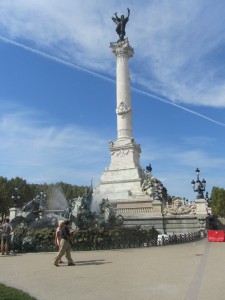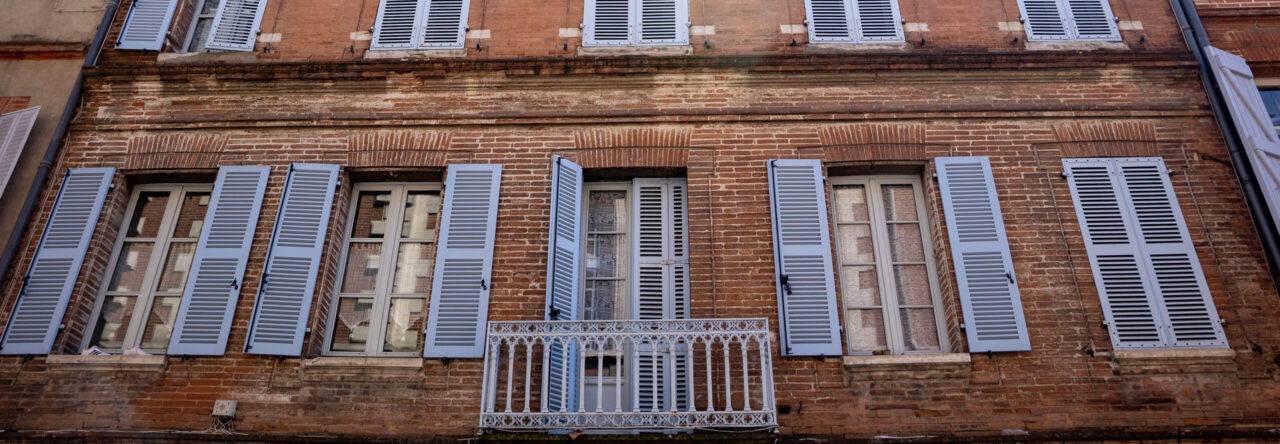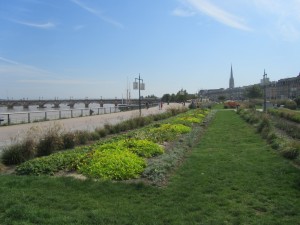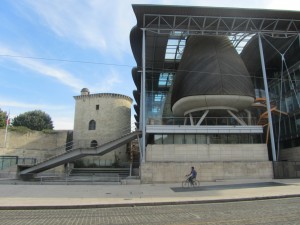Thank you very much to Kristina Niedermayer, Ellen Aldin and Anna Applebaum for contributing to the first edition of La Une with such enthusiasm and devotion.
A week-end in Bordeaux
by Anna Applebaum
 North-west of Toulouse and close to the Atlantic Ocean, Bordeaux was historically a very important port city. The commerce of the port enriched the city and its citizens and the product of that wealth remains visible today. Bordeaux is well known for large houses of white stone, as well as a large cathedral, fortified clock tower and the vestiges of the ramparts of the old port city. However, there is a modern section of Bordeaux as well and it’s quite visually striking to see the old stone houses juxtaposed with modern buildings of glass and steel. Bordeaux feels less cosmopolitan than Toulouse, but perhaps more bourgeois. There are lots of expensive shops like Cartier and Dior and Bordeaux’s population is quite stylishly attired. One of Bordeaux’s most famous attractions are the long pedestrian walkways right alongside the Garonne river, a waterway that passes through Toulouse as well. These “quais” are always filled with people ambling about and meeting friends. All in all, I found Bordeaux to be a beautiful city with many things to see, even if it lacks the quick pulse of life in Toulouse.
North-west of Toulouse and close to the Atlantic Ocean, Bordeaux was historically a very important port city. The commerce of the port enriched the city and its citizens and the product of that wealth remains visible today. Bordeaux is well known for large houses of white stone, as well as a large cathedral, fortified clock tower and the vestiges of the ramparts of the old port city. However, there is a modern section of Bordeaux as well and it’s quite visually striking to see the old stone houses juxtaposed with modern buildings of glass and steel. Bordeaux feels less cosmopolitan than Toulouse, but perhaps more bourgeois. There are lots of expensive shops like Cartier and Dior and Bordeaux’s population is quite stylishly attired. One of Bordeaux’s most famous attractions are the long pedestrian walkways right alongside the Garonne river, a waterway that passes through Toulouse as well. These “quais” are always filled with people ambling about and meeting friends. All in all, I found Bordeaux to be a beautiful city with many things to see, even if it lacks the quick pulse of life in Toulouse.
Little reflexion about French
by Kristina Niedermayer
I believe almost all of the women in France are much thinner than women in the United States. When I first arrived in Toulouse, I could not understand how this could be possible because the French eat so much meat and bread! After spending time here, I have learned that french women (and french men as well) eat everything, but they eat in moderation. This concept of moderation is not as prevalent in the United States where there is a certain concentration on “the most.” Almost all americans aspire to drive big cars, live in large houses, and of course, eat large portions of food. I much prefer the French concentration on moderation because it allows for a focus on the quality of food instead of its quantity. The best part of my day is when I come home to my host family to eat delicious food, drink outstanding wine, and enjoy pleasant conversation. Here in France, I can truly enjoy wonderful food because I have am given the opportunity to appreciate its quality.
Piano at the Jacobins
by Ellen Aldin
On September 15, 2011, the group of 14 students in the Dickinson in France program spent the eveningat the clositer of the Church Les Jacobins to see a piano concert. The pianist for the concert was Ronald Brautigam and heplayed 4 Beethoven sonatas : no. 8 in minor (Pathetique), no. 15 in D major (Pastorale), no. 14 in C sharpminor (Clair de Lune), and no. 23 in F minor (Appassionata). This concert was one in the series Piano aux Jacobins, an annual festival for piano everySeptember in the cloister of Les Jacobins.
I have seenseveraloutdoorclassical music concerts, but this one was unique. The spectatorswereseated in the cloister’sgarden or in a small room with the pianist, but everyonecouldsee the pianist. And hewas a dymanic performer. He did not sitstillwhenheplayed ; hemovedhis body with the rhythm of the music. But if the spectatorsgrewtired of watching the pianist for a moment, theycouldeasilytake in the cloisterwithitsgarden, columns, and tower, which lit up at night. Therefore, i twas verydifficult to beboredduring the concert, eventhoughitlasted for threehours.
The classical music demonstrated a range of Beethoven’swork. There was music thatwasloud and soft, slow and fast, minor and major. I am not a classical music critic, but I thoughtthatBrautigamplayedverywell, especiallywith the variety of styles thatheplayedduring the same concert. It seemedlike the othermembers of the audience agreedwith me. At the end of the performance, theyapplauded for several minutes, sometimes in unision (« slow clap ») to express theirwish for an encore and Braugitampleasedthem. Afterhefinished the sonatas, heplayedseveralfamous short piano pieces for an encore.
I was surprised at how much I enjoyed the concert, and I was not the onlymember of the group with the same sentiment. With thebeatiful music in a gorgeous space, it was very easy to enjoy yourself at the Piano aux Jacobins.


